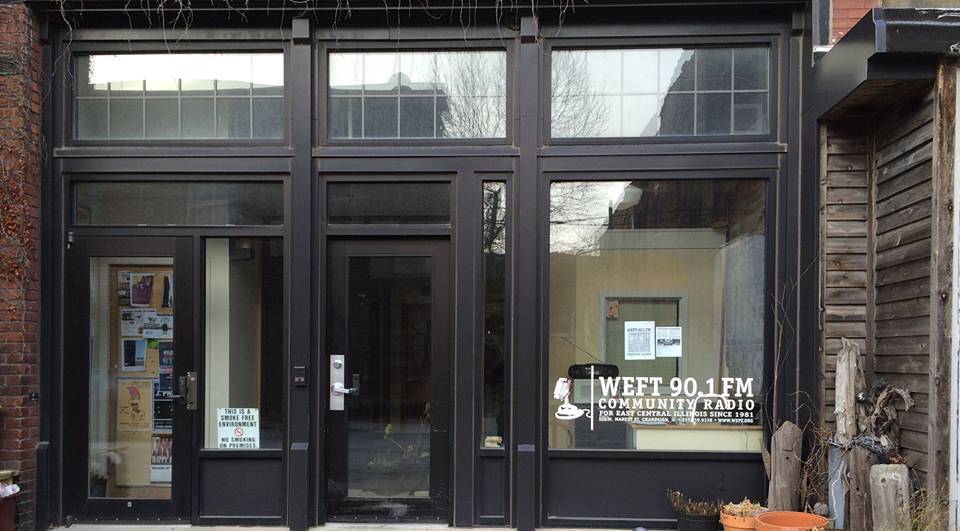WEFT 90.1 has been putting the sounds of Champaign-Urbana community members on air since 1981. The unassuming studio — which is located next door to Mike n Molly’s in downtown Champaign — still puts out a rich smorgasbord of music, alternative news, and creative programming seven days a week.
I spoke with two long-time WEFT “airshifters” about the history of our community radio station and WEFT Fest, its free concert and gathering for the community, which is coming up on September 13th.
———
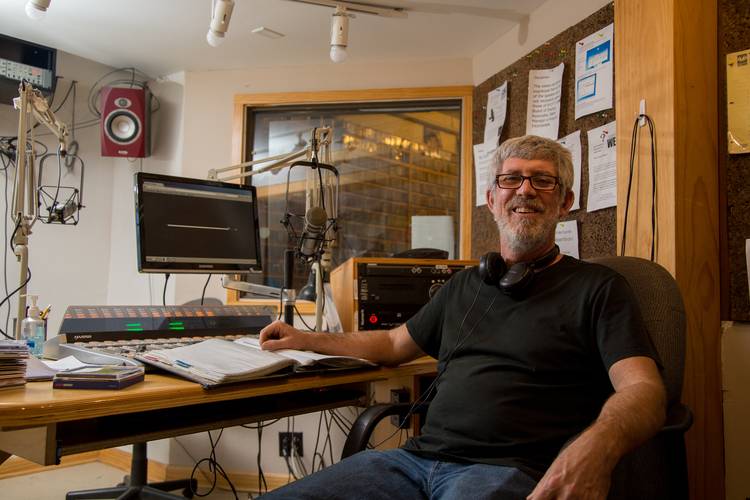 Kevin Elliott told me that he has been involved with WEFT for roughly twenty years. During that time, he has held almost every position in the organization, but currently he’s settled into the Music Committee. WEFT has a vast collection of recordings — particularly blues, jazz, world, and local music — and, as a member of the Music Committee, Elliott reviews folk and Americana CD’s each week for consideration in WEFT’s collection. He also hosts one of WEFT’s most popular music shows, From the Joshua Tree Inn.
Kevin Elliott told me that he has been involved with WEFT for roughly twenty years. During that time, he has held almost every position in the organization, but currently he’s settled into the Music Committee. WEFT has a vast collection of recordings — particularly blues, jazz, world, and local music — and, as a member of the Music Committee, Elliott reviews folk and Americana CD’s each week for consideration in WEFT’s collection. He also hosts one of WEFT’s most popular music shows, From the Joshua Tree Inn.
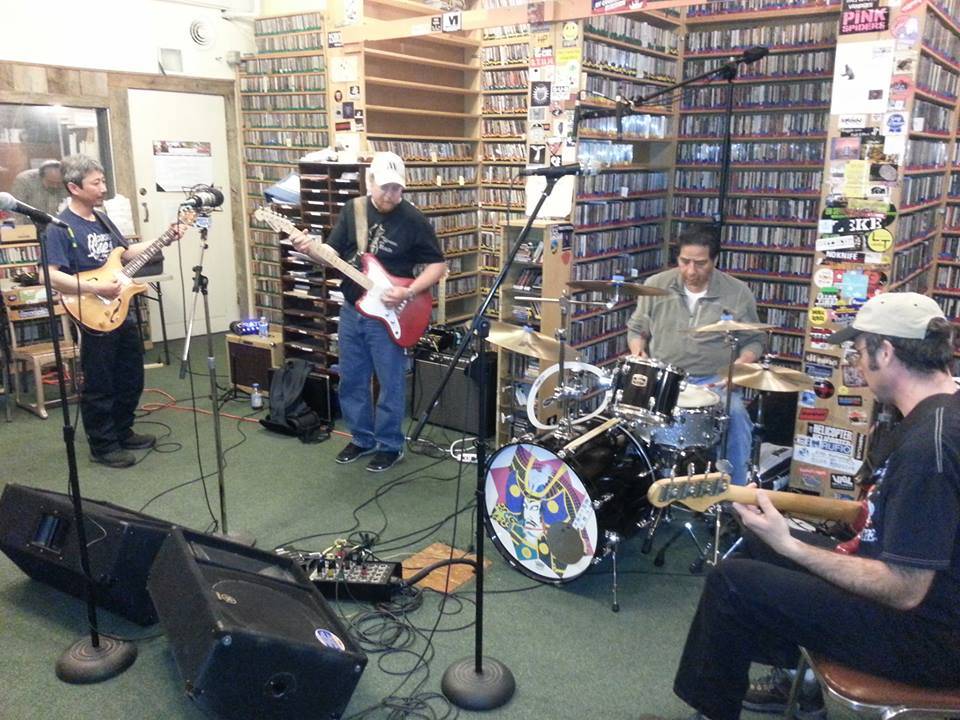
Smile Politely: How did you first get involved with WEFT?
Kevin Elliott: I began volunteering with WEFT in 1995, which I took the airshifter training. Prior to that, I had been a WEFT member because I donated money to the station. As an airshifter, I started out doing simple things like standing by for the pre-recorded news programs on the WEFT Courier. At that time, there was a long-running show on WEFT that Jay Rosenstein, a professor at UIUC, had started called From the Joshua Tree Inn. It played a lot of bluegrass and Americana music. I took that over from him in 1996, and I’ve been doing it ever since. My genre is primarily folk music, but the show includes rock and some alt-country, bluegrass, blues, and jazz.
SP: Tell me about WEFT’s history.
Elliott: The notion of community radio got started in the 1940s. Community radio has always been distinct from public radio: at the time, public radio was largely funded by the government and grants. Community radio has always been mostly funded by donations from the community. It is not ear-marked by particular government programs; it is completely determined and run by community volunteers. A group of people in Champaign-Urbana came together in the 1970s to create a community radio station, and, after a lot of fundraising efforts, the station was up and running by 1981 in the same location where it is today: 113 N. Market in downtown Champaign.
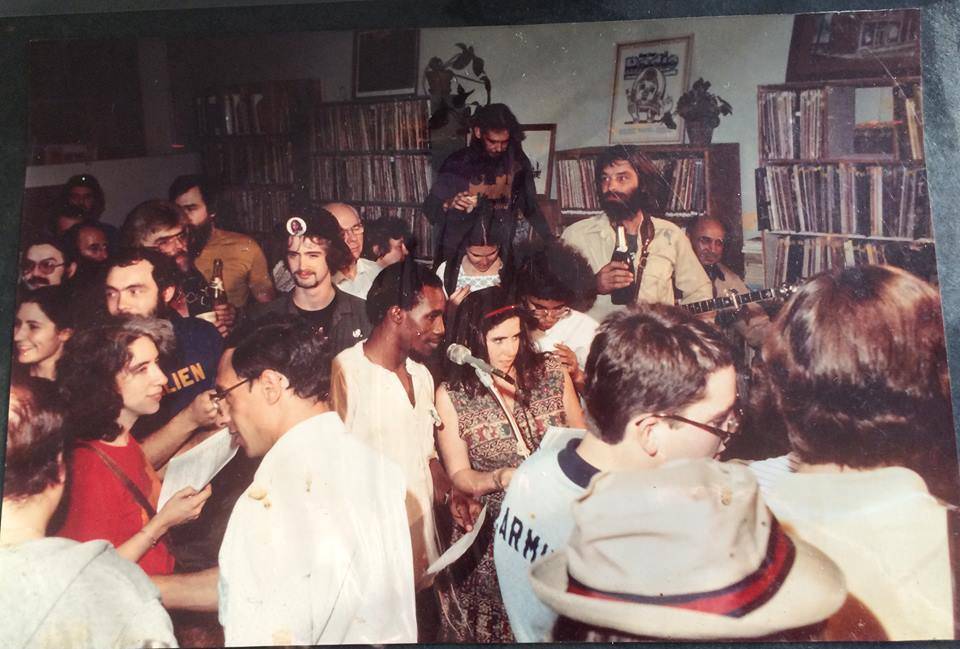
WEFT in 1981.
In community radio, there is not a station opinion on things. Each separate programmer or airshifter has his or her own voice and opinions. Airshifters don’t have to answer to anyone; they can determine what they want to go on the air, within FCC guidelines. Having that kind of voice for the community, and not having to rely on advertisers or outside funding, is a valuable thing. WEFT has a good reputation among community radio stations nationwide for its music programs. It’s also one of the main providers for alternative views on politics and social thought here in C-U.
SP: Why, in your view, is community radio still important today?
Elliott: We’re in changing times. The media has changed so much in recent years, and now people have access to a wide variety of sounds through online services. But WEFT is still a primary source of new sounds and new information, especially about local topics. It’s main way that people get to hear things they wouldn’t otherwise get to hear. It’s very cool that C-U has such a vibrant community radio station. Not many communities in Illinois have community radio, especially a station with WEFT’s history.
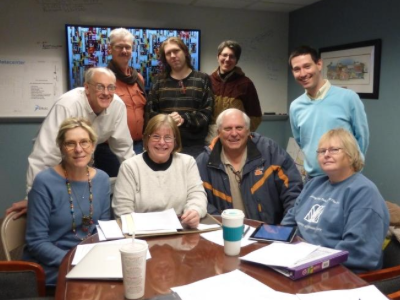 Barbara Trumpinski-Roberts (bottom right) has been involved with WEFT from its earliest days and held many volunteer positions over the years. She currently hosts one of WEFT’s longest running shows, Womyn Making Waves, which features women’s music, and serves as the chair of the public relations committee.
Barbara Trumpinski-Roberts (bottom right) has been involved with WEFT from its earliest days and held many volunteer positions over the years. She currently hosts one of WEFT’s longest running shows, Womyn Making Waves, which features women’s music, and serves as the chair of the public relations committee.
SP: Why, in your view, is community radio still important today?
Barbara Trumpinski-Roberts: Community radio is important because we provide access to local music and local news that people wouldn’t otherwise hear. And we give people the chance to hear something that’s not corporate radio.
WEFT started as a group effort in the mid-1970s, back when local radio stations changed format. Many people in the community decided we needed something to represent ourselves on the airwaves. That’s what WEFT does. It’s listener-supported and volunteer-operated.
It provided an alternative. Back in the mid-70s, you didn’t have satellite radio, Pandora, or other services that allow you to hear anything you want any time of the day or night. The people who started WEFT believed there was more to radio than just top-forty rock and roll. WEFT provided a voice for people who didn’t have a voice in local radio or television.
SP: How would you describe WEFT today?
Trumpinski-Roberts: WEFT is like a family. It really is a community. The more you get involved, the more you want to get involved.
———
This year’s WEFT Fest will take place on September 13th from 5–10 p.m. Although WEFT will still be in the midst of its pledge drive, WEFT Fest is free: Trumpinski-Roberts described the event as a “a celebration of WEFT and community radio.”
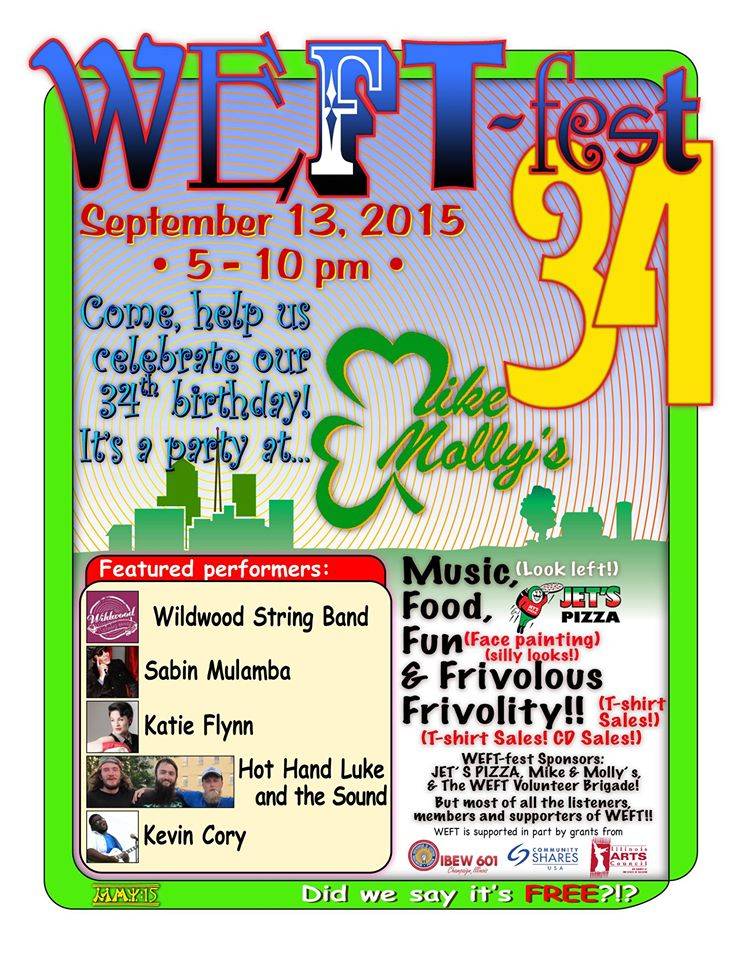
“It started when WEFT started as WEFT’s birthday party,” she said. “WEFT started on the air on September 25 in 1981. We’ve been having WEFT Fest as a celebration of that anniversary ever since then. WEFT Fest represents everything that’s good about WEFT: a bunch of difference genres of music, good people and food. It’s a way to enjoy and meet the faces behind the radio.”
This year’s lineup features a wide range of genres: the Wildwood String Band, Sabin Mulamba, Katie Flynn, Hot Hand Luke and the Sound, and Kevin Cory. WEFT will provide free pizza until it runs out, and drinks are on your own.
Trumpinski-Roberts said that the free entertainment at WEFT Fest should not detract from the importance of donating to the pledge drive. “We are supported by people who listen to us,” she said. “We don’t have a Corporation for Public Broadcasting grant that we used to have, so we have to raise enough money to make up for that. It’s actually quite a bit. It takes $10-12,000 a month to run WEFT. We really do want people who listen, like, and appreciate WEFT to call during the pledge drive and support us financially.”
Even if you don’t donate, find WEFT on your dial sometime this month for a taste of one of C-U’s longest living community media organizations.








